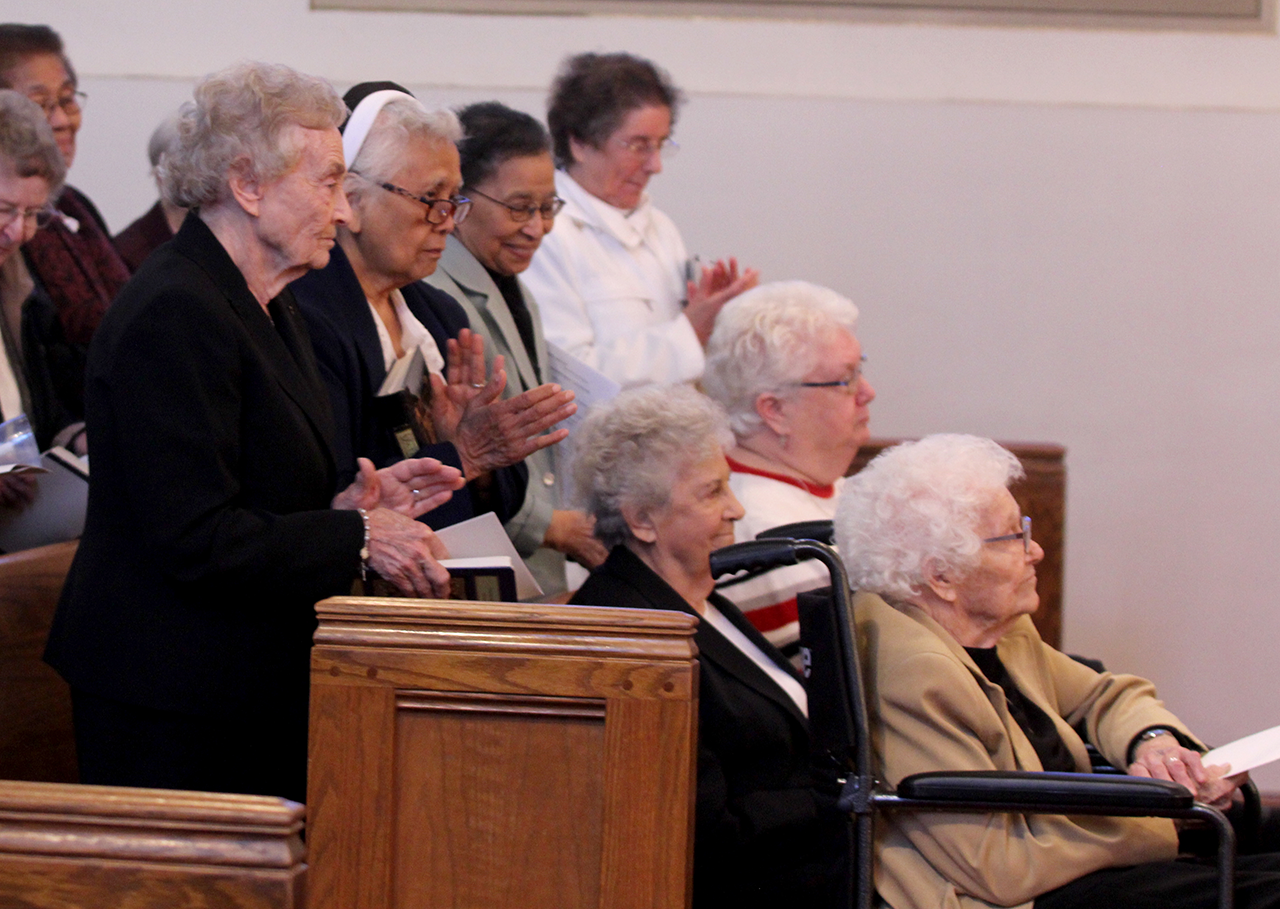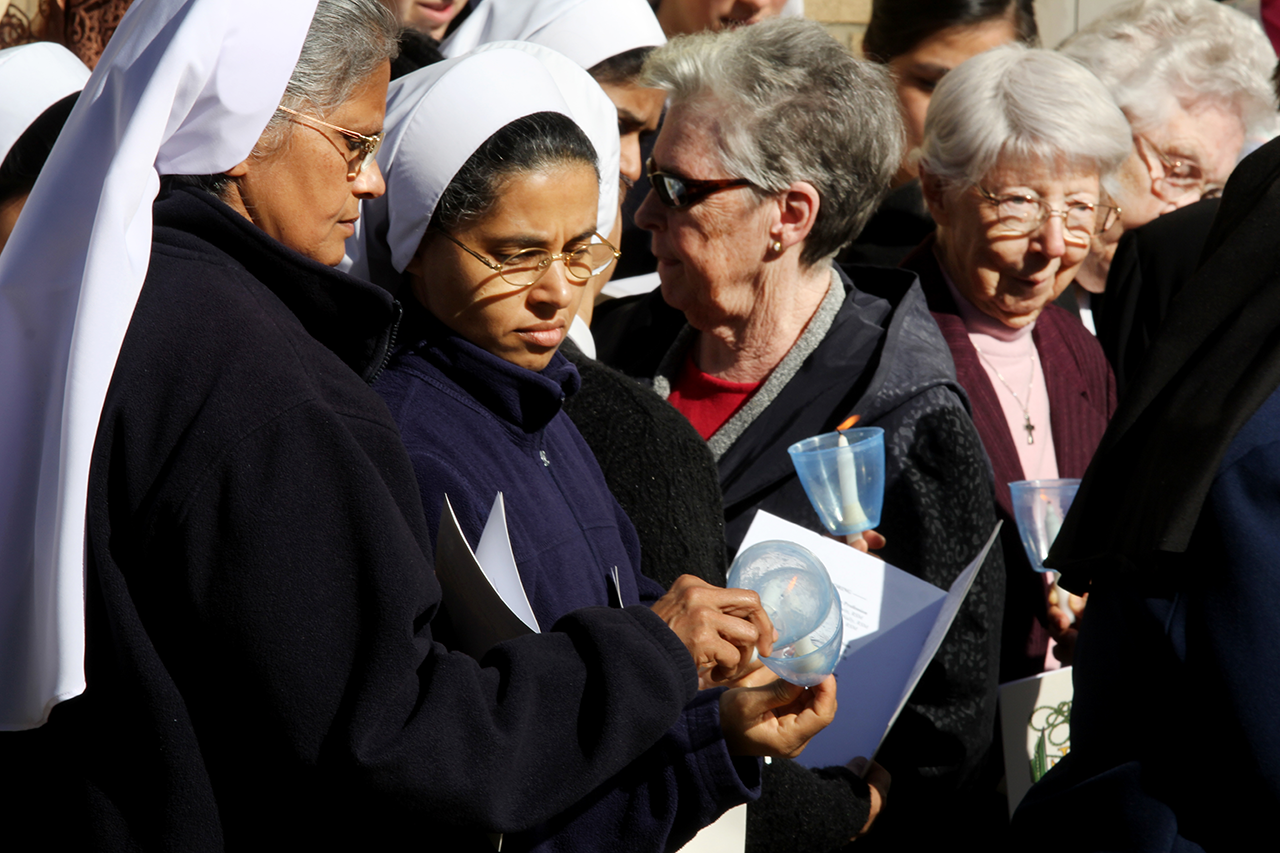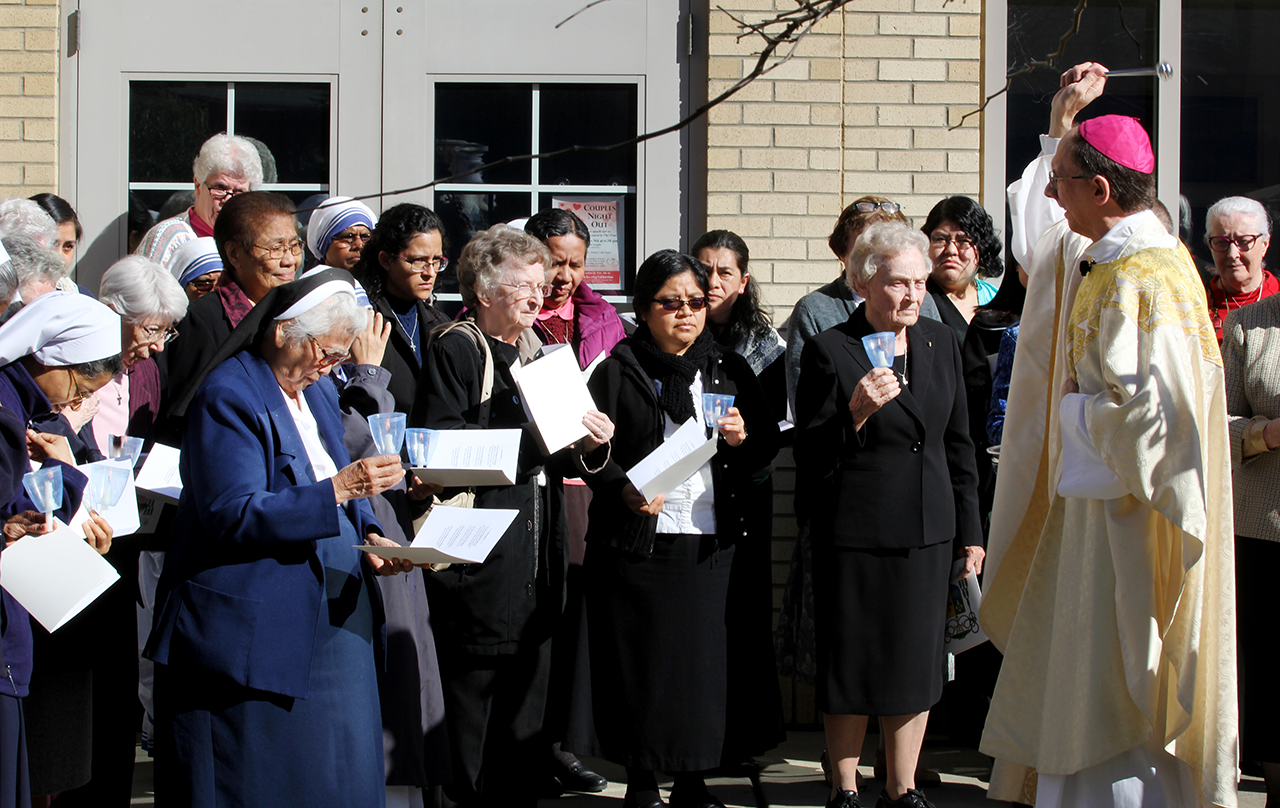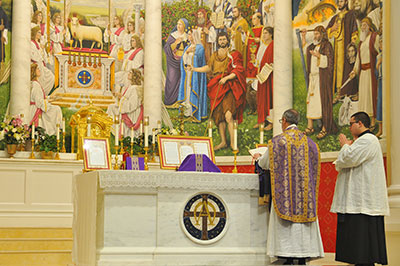 CHARLOTTE — St. Ann Church and the Charlotte Latin Mass Community celebrated Septuagesima Sunday with a high Mass offered by pastor Fr. Timothy Reid on Feb.17.
CHARLOTTE — St. Ann Church and the Charlotte Latin Mass Community celebrated Septuagesima Sunday with a high Mass offered by pastor Fr. Timothy Reid on Feb.17.
In the Extraordinary Form (Latin) calendar, a pre-lent season called Septuagesima begins three weeks prior Lent to prepare the faithful for the extra prayers and penances required during the upcoming penitential season.
Accordingly, the priest wears violet vestments to begin drawing people to begin focusing on Lent.
In Latin, Septuagesima means seventy, in reference to 70 days before Easter.
The Sundays following Septuagesima are called Sexagesima (60) and Quinquagesima (50).
For more information about the Latin Mass, contact Chris Lauer at This email address is being protected from spambots. You need JavaScript enabled to view it. or visit: www.charlottelatinmass.org.
— Photo by Markus Kuncoro
Our brother’s keeper
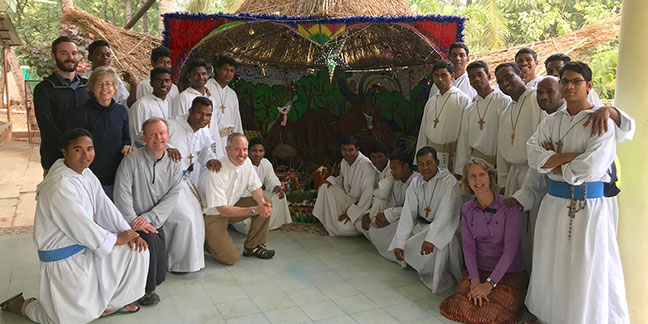 CHARLOTTE — Boys living with HIV. Toddlers with disabilities abandoned by their families. Men who are mentally or physically disabled. These are the people a group of St. Ann parishioners recently traveled halfway around the world to care for in Warangal, India.
CHARLOTTE — Boys living with HIV. Toddlers with disabilities abandoned by their families. Men who are mentally or physically disabled. These are the people a group of St. Ann parishioners recently traveled halfway around the world to care for in Warangal, India.
St. Ann Parish is a longtime supporter of the Missionaries of the Poor, a community of religious men who serve the poorest of the poor, people who have been cast off from society, in missions all over the world – in India, Jamaica, the Philippines, Africa, and even here in the Diocese of Charlotte in Monroe.
For the past three years parishioners have donated $100,000 to pay school fees for orphans and provide support to the Missionaries of the Poor in southern India, which runs two missions: Divine Mercy Orphanage, which cares for boys who contracted HIV at birth, and the House of Joy, a home for disabled boys and men. Parishioners visited the homes last month on an unforgettable mission trip that took them 17,000 miles from Charlotte to Warangal.
Lucie Tonon, whose husband Deacon Peter Tonon serves St. Ann Parish, was among the missioners.
“On this mission trip we worked in the apostolate and took a few side trips,” Tonon says, to see how St. Ann’s donations have been put to good use.
The Tonons have been longtime supporters of the Missionaries of the Poor, traveling to their centers in Jamaica, Haiti and Uganda over the past 14 years. She also helps the brothers with their mission in Monroe. Father Richard Ho Lung, founder of the Missionaries of the Poor, even asked her to manage the Holy Innocents Project in Jamaica, designed to house pregnant women and children.
Tonon admits she did not really want to go India. “In fact, I said ‘no, thank you’ three times prior to going this time. This year no one asked me to go, but I felt God calling me to go and to trust Him.”
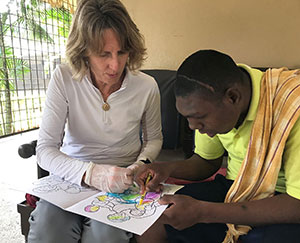 Lucie Tonon colors with a resident at the House of Joy. St. Ann missioners, pictured at Christ the King Monastery, worked with the Missionaries of the Poor in India. (Photos provided by Father Timothy Reid)But the impact this mission trip and others have had on her faith is huge, she says. “The Lord teaches you something each and every time you go. Sometimes I feel it is one word, like a heightened sense of gratitude. When the poor are so appreciative of every little thing you give them, like a piece of paper and a crayon, why can’t we be appreciative of the things people give us in America?”
Lucie Tonon colors with a resident at the House of Joy. St. Ann missioners, pictured at Christ the King Monastery, worked with the Missionaries of the Poor in India. (Photos provided by Father Timothy Reid)But the impact this mission trip and others have had on her faith is huge, she says. “The Lord teaches you something each and every time you go. Sometimes I feel it is one word, like a heightened sense of gratitude. When the poor are so appreciative of every little thing you give them, like a piece of paper and a crayon, why can’t we be appreciative of the things people give us in America?”
“The residents of these missions are your teachers, who give you lessons if you just watch them. Many residents have been left at the hospital or in the street by their family when the brothers pick them up. Their new family becomes their fellow residents and the brothers,” she explains.
What also touches her is how the residents who can walk fetch wheelchairs for those who can’t walk, and then happily bring those residents to the table to eat. “They care for each other like healthy families care for one another,” she says.
These mission trips “take you out of your comfort zone” but are very gratifying, says St. Ann’s pastor, Father Timothy Reid.
“We do whatever the brothers need us to do,” Father Reid says.”It’s nice to take the material blessings that we have and share them over there. I feel good about St. Ann supporting this mission, because we are not just supplying blankets, we’re sharing our faith.
“It enkindles more deeply the virtue of charity. Doing this type of trip brings out the very best in people. They become more generous. It increases their gratitude.”
Parishioners Chris and Steve Brunhuber also accompanied Tonon and Father Reid on the mission. For Chris, this was her second mission trip to India. She has also served on mission in Jamaica with the Missionaries of the Poor.
Brunhuber says of the difficult circumstances that have led to the boys and men being abandoned by their families, “It is heartbreaking, but through the brothers’ calling they truly live up to what the Lord calls us to do and that is to be ‘our brother’s keeper.’ The Missionaries of the Poor truly exemplify this phrase.”
She and Steve like to go on mission trips “because we enjoy serving others who are less fortunate and we enjoy supporting the Missionaries of the Poor. These experiences helped us grow spiritually and help us learn to see Christ in the eyes of all the people we serve.”
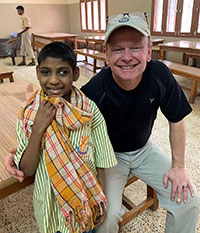 St. Ann parishoner Steve Brunhuber helps a resident while on mission in January at the House of Joy in Warangal, India.Brunhuber admits that she “never truly understood that expression until I became involved in these mission trips and worked directly with the people who needed love and kindness so much.”
St. Ann parishoner Steve Brunhuber helps a resident while on mission in January at the House of Joy in Warangal, India.Brunhuber admits that she “never truly understood that expression until I became involved in these mission trips and worked directly with the people who needed love and kindness so much.”
“Although we have participated in other charitable outreach situations locally, these experiences have helped heighten our awareness of what is going on in the world, and whether we are giving locally or internationally we are trying to live by the fact that we are our brother’s keeper,” she says.
Tonon reflects on their mission experience, adding, “The brothers teach you how to pray and how to give God the glory in all they do. The brothers are dedicated servants, taking absolutely nothing for their time and hard work. They do what they do for the love of the Lord. They give all of themselves.
“So I come back each time and ask the Lord to teach me how to be more dedicated to Him, just one little step. Can I be obedient like the brothers? Can I love a little more or be a little more selfless? Can I remember the importance of praying before I do every little thing?”
— SueAnn Howell, Senior Reporter
Bishop Jugis celebrates World Day for Consecrated Life Feb. 2
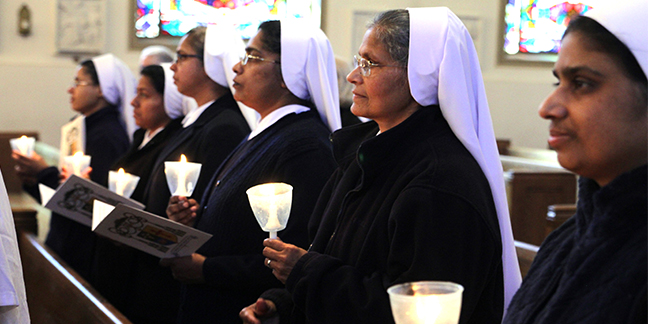 CHARLOTTE — The annual Mass for the World Day For Consecrated Life this year fell on the feast of the Presentation of the Lord, Feb. 2.
CHARLOTTE — The annual Mass for the World Day For Consecrated Life this year fell on the feast of the Presentation of the Lord, Feb. 2.
The sunny day lent itself to an outdoor ceremony, where Bishop Peter Jugis performed a rite of blessing of candles for Candlemas. He also blessed dozens of the religious brothers and sisters who gathered for Mass, sprinkling them with holy water before everyone processed, candles in hand, into St. Patrick Cathedral.
The annual Mass is an opportunity for Bishop Jugis to thank the religious men and women from across the Diocese of Charlotte for their decades of service to Christ and His Church.
Religious men celebrating special jubilee anniversaries this year include two Benedictine monks from Belmont Abbey in Belmont: Father Francis Forster and Father Arthur Pendleton (55 years).
Religious women celebrating special jubilee anniversaries include: Mercy Sister Mary Julia Godwin, Mercy Sister Jeanne-Margaret McNally, and Mercy Sister Mary Agnes Solari (70 years); Sister of Providence Katherine Francis French and Sister of St. Joseph Emma Yondura (50 years); and Sister Sheila Richardson, ESA, and Sister Ginsy Simon, SVP (25 years).
During his homily, Bishop Jugis noted that this year is the 22nd anniversary of the World Day for Consecrated Life, which was instituted by St. John Paul II in 1997.
He told the religious men and women that “You are sacred to God as consecrated persons because of your special vocation of consecrated life.”
Bishop Jugis explained that the word sacred seems to say a lot more than just “holy to God,” or “dedicated to God” or “devoted to God” – all of which are indeed true of the consecrated life. But the use of the word sacred means that there is something more being communicated.
“You are sacred to God,” he told them.
He noted that Catholics appreciate the connection between the feast of Mary and Joseph consecrating their child to God and the Church’s celebration of consecrated life. Both are declarations of someone who is sacred to God – consecrated to Him.
“It is such a beautiful vocation, such a beautiful calling to which you have responded so generously and are living so faithfully, because you do have a very special role to play in the Church as a witness to that holiness,” Bishop Jugis said.
We should pray for God to give the grace of a vocation to consecrated life to more young men and women, he said, so that this vocation of sacredness is able to shine forth even more beautifully, more powerfully, in even greater numbers in the Church today.
“More young people need to be, by our prayers, encouraged; asking God to embrace the vow of poverty, renouncing personal ownership of material possessions to be totally for God,” he said. “To embrace the vow of chastity, renouncing marriage and children and family life for the sake of the Kingdom of God, to be totally free for God.”
More young people need to embrace the vow of obedience, renouncing one’s own willfulness to bring one’s will into conformity to God’s Will, he continued. This is what it means to be sacred and totally for God, he explained: to belong completely to Him without any other distractions.
“Such a beautiful and powerful vocation, and as the Church teaches, also essential to the life of the Church – the consecrated life,” he continued. It is “essential to the mission of the Church.”
“Before anyone can go out to be a witness for Christ in the world and to evangelize, we have to be holy. We have to know Christ. We have to be living in His love – because it is Christian life lived which is attractive to those who are drawn to the Church,” Bishop Jugis said.
People are not just drawn by the Word of God that is proclaimed to them, but what they see lived in the Christian life, the holiness of the Church – living in Christ’s love and having a personal relationship with the Savior.
“Truly, you consecrated persons are like a leaven in the Church, lifting up that call to holiness, lifting up that call to be sacred to God,” he told the consecrated women and men.
“That is something so beautiful, so attractive, which others outside of the Church, as they take a closer look, say, ‘I want that. Whatever it is they have, I want that holiness of the Church for myself also.’”
“You consecrated religious are a special, shining, brilliant, strong sign of that sacredness because of your consecrated life,” Bishop Jugis emphasized.
“Thank you for the witness of your consecrated lives, joyfully living in Jesus’ holiness and grace. We pray that you will continue to inspire all of us in this local Church to a closer following of Jesus,” he said.
At the conclusion of Mass, Bishop Jugis joined members of more than 11 religious communities from across western North Carolina in the Family Life Center at St. Patrick Cathedral for a luncheon in their honor.
One of the jubilarians this year, Providence Sister Katherine Francis French, has worked in both education and nursing over the past 50 years in several states. She is now serving parishes around the Charlotte diocese with their adult education needs.
She said of her religious vocation, “It’s been wonderful. I enjoy my relationship with the Lord and also the full sense of community, the comradery with sisters, no matter what religious order we belong to.”
She said she thinks there is something special when religious communities get together “that we feel that binds us together even though we are not in the same community.”
Sister Katherine said being a part of a community “is so special. It is a special charism that we share. Ours happens to be to honor Providence; that God is always watching out and taking care of you.”
— SueAnn Howell, senior reporter
 BALTIMORE — A young South Sudanese refugee raising her siblings in Uganda’s Bidi Bidi refugee settlement. A father returning home after decades of civil war in Sri Lanka to find his farm overgrown. A young woman unable to find work in Gaza – and forbidden from seeking opportunity abroad. These are just some of the stories participants will explore through CRS Rice Bowl, CRS’ Lenten faith-in-action program.
BALTIMORE — A young South Sudanese refugee raising her siblings in Uganda’s Bidi Bidi refugee settlement. A father returning home after decades of civil war in Sri Lanka to find his farm overgrown. A young woman unable to find work in Gaza – and forbidden from seeking opportunity abroad. These are just some of the stories participants will explore through CRS Rice Bowl, CRS’ Lenten faith-in-action program.
Following the lead of Pope Francis, CRS Rice Bowl invites Catholics across the country to take part in the second year of “Share the Journey” (www.sharejourney.org), a global campaign launched by the pope to raise awareness and inspire action on behalf of migrants and refugees worldwide.
“We hear about migration and refugees in the news every day,” said Beth Martin, director of U.S. Programs for Catholic Relief Services. “We encounter so many families around the world forced to migrate, either because of conflict and violence or the inability to make a living, and their stories lead us to a more human understanding of this complex issue.”
CRS Rice Bowl has been sharing the stories of women, men and children with whom CRS works for nearly 45 years. Built around the Lenten spiritual pillars of prayer, fasting and almsgiving, the program has been a tradition for thousands of Catholic families in every diocese in the U.S.
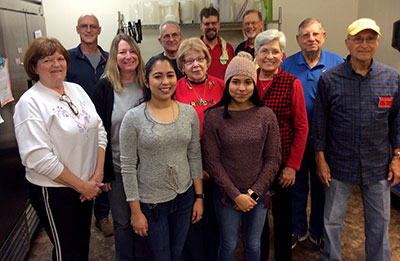 Our Lady of the Annunciation Church’s Community Table Soup Kitchen volunteers include (from left, front row) Natalie and Karina Sedano; (from left, second row) Nancy Barker, Kellie Fischer, Alice Lombardo, MaryBeth Staiano, Vince Lombardo and Rick Matthews; and (from left, back row) Rob Ostrander, Joe Cutrone, Greg Fischer and Bill Staiano. (Photo provided by Don Barker)Every year, people in more than 14,000 faith communities across the country are using nearly 4 million “rice bowls” for almsgiving, resulting in nearly $12 million annually – $9 million of which supports CRS programs around the world. The remaining $3 million, or 25 percent of total alms collected, stays in the local diocese, supporting hunger and poverty alleviation efforts.
Our Lady of the Annunciation Church’s Community Table Soup Kitchen volunteers include (from left, front row) Natalie and Karina Sedano; (from left, second row) Nancy Barker, Kellie Fischer, Alice Lombardo, MaryBeth Staiano, Vince Lombardo and Rick Matthews; and (from left, back row) Rob Ostrander, Joe Cutrone, Greg Fischer and Bill Staiano. (Photo provided by Don Barker)Every year, people in more than 14,000 faith communities across the country are using nearly 4 million “rice bowls” for almsgiving, resulting in nearly $12 million annually – $9 million of which supports CRS programs around the world. The remaining $3 million, or 25 percent of total alms collected, stays in the local diocese, supporting hunger and poverty alleviation efforts.
Last year’s 25 percent of the CRS Lenten Rice Bowl Collection – $15,088 – has helped fund hunger and poverty fighting programs of diocesan parishes and ministries through Catholic Charities $1,000 CRS Rice Bowl Mini Grants. With such a grant, the Food for Families Program of Our Lady of the Annunciation Church in Albemarle provided food to 51 families at Christmas through its STAR ministry and also supported the parish’s ongoing Community Table Soup Kitchen.
For people like Alejandra Estrada, parish volunteer in the Diocese of Orange, CRS Rice Bowl isn’t just a charity – it’s a way of living out her Catholic faith.
“We are all children of God and, therefore, we deserve to live with dignity,” she said. “We are called to announce the Gospel with our actions. And what better opportunity do we have than Lent? As Catholics, we should live Lent with a lot of intensity, through moments of prayer, reflection, and almsgiving.”
An immigrant herself, Estrada understands better than most the kinds of struggles faced by many of the people featured in the CRS Rice Bowl stories. And she’s passionate about bringing those stories to life for her community.
“It’s that connection to those we’ve never met that makes CRS Rice Bowl an integral part of the Lenten journey,” Martin said. “Our faith calls us to welcome the stranger and care for those in need. Lent is a perfect time to reflect on our lives and deepen our commitment to our neighbors – both near and far.”
Resources available online
At www.crsricebowl.org: Catholic Relief Services has a lot of resources for you and your family this Lenten season. Besides the rice bowl kit that you can download online, find “Stories of Hope” from people who have been aided by CRS, a video series of reflections exploring the meaning of Lent, a Lenten “digital retreat,” and meatless recipes from the countries featured during Lent. All materials are available in English and Spanish.
How to give and mini-grants information
If your parish or school participates in the CRS Rice Bowl campaign, giving guidelines are provided. You can also give directly to CRS Rice Bowl securely online at www.crsricebowl.org; by phone at 1-877-435-7277; or by mail to CRS Rice Bowl, P.O. Box 17090, Baltimore, MD 21297-0303. Find info on CRS Rice Bowl $1,000 Mini Grants at www.ccdoc.org/cchdcrs.
Rights and Responsibilities
Catholic social teaching inspires and guides how we are to live and work in the world. In this principle, Rights and responsibilities, we remember that every person has basic rights that make life truly human. Corresponding to our rights, we all have duties and responsibilities to one another, our families and the larger society.
Share the journey: A good education doesn’t just benefit the student. It benefits the family, the community, and the common good, allowing individuals to flourish without needing to leave home:
Encounter the Kamara family
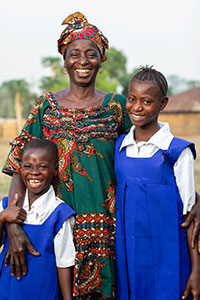 Waisa Kamara didn’t spend a single day in school. When she was young, no one thought girls should receive an education. Plus, there was work to do. She helped her 12 siblings at her family’s farm. She was responsible for helping her mom sell meat to their neighbors.
Waisa Kamara didn’t spend a single day in school. When she was young, no one thought girls should receive an education. Plus, there was work to do. She helped her 12 siblings at her family’s farm. She was responsible for helping her mom sell meat to their neighbors.
Now, things have changed in Sinkunia, a town in the north of Sierra Leone. Waisa knows the importance of education – especially for girls. “If there’s education, Sierra Leone will develop,” she says. “Our students will make sure of it.”
That’s why Waisa insists that her 12-year-old granddaughter, Kumba Kamara, attends the nearby CRS-sponsored school, so she can learn how to make a difference in her community and her country. And, through the nutritious lunch that CRS gives to each student every day, Kumba and her classmates can focus on their studies and not on their hunger.
Kumba’s favorite subject is math because she likes the challenge. And when she completes her education, she wants to be a nurse. A nurse, Kumba says, helps cure the sick, and if there were more nurses in Sinkunia, those who get sick wouldn’t have to leave the town to get healthcare.
Waisa is proud of her granddaughter and continues to work hard to support her. With no shade from the hot sun, Waisa cares for the family’s garden, watering eggplants, tomatoes, onions and more to be harvested and sold through the streets of Sinkunia. Kumba helps, too, visiting the garden every day after school.
“I’m happy if I can support my daughters and granddaughters, even through university,” Waisa says. With a smile, she adds, “I know that educated girls help their parents and their communities.”
At www.crsricebowl.org/stories: Watch a video about Kumba Kamara and her family
Kumba B. Kamara, 12, and her cousin, Saio B. Kamara, 8, with their grandmother, Waisa Kamara before school. CRS partners with the District Education Council (D.E.C.) Sinkunia primary school in the town of Sinkunia, Sierra Leone, to provide school lunches as part of the McGovern-Dole Food for Education Program. As part of this program, CRS feeds 32,000 school children across Sierra Leone each day. In a country with a literacy rate of 43 percent, this initiative encourages students to stay in school and focus on their studies instead of their hunger. (Photo by Eric Clayton | Catholic Relief Services)
Facts: Sierra Leone
Population: 6,163,195
Size: 71,740 square miles – slightly smaller than South Carolina
- After a 10-year civil war in the 1990s, CRS projects in Sierra Leone are helping to rebuild the country with a focus on integrating peace-building.
- Rates of child and maternal mortality are high, levels of education are low and, despite rich resource endowments and abundant land, more than 60 percent of Sierra Leoneans live on less than $1.25 a day.
- The Ebola outbreak in Sierra Leone in 2014 was the worst the world has seen, covering the entire country and causing thousands of deaths. CRS was one of the organizations on the front lines control-ling the outbreak.
Ground nut stew from Sierra Leone
2 tbsp. fair trade olive oil
1 onion, chopped
1 clove garlic, minced
1 red pepper, chopped
4 tomatoes, diced
2 carrots, chopped
1 chili pepper, diced
2 tsp. salt
1/2 tsp. ground cumin
1/4 tsp. black pepper
3 cups water or vegetable broth, plus more as needed
1/2 cup creamy peanut butter
2 cups white rice
Heat olive oil in large pot over medium heat. Sauté onion until brown and add garlic. Add red pepper, tomatoes, carrots, chili pepper, spices and water/broth. Bring to a boil, then cover and cook on low until veggies are soft. Stir in peanut butter until evenly mixed. Serve over rice.
Makes 4-6 servings.
Editor’s note: Find more meatless recipes and the stories behind their cultures online at www.crsricebowl.org.






